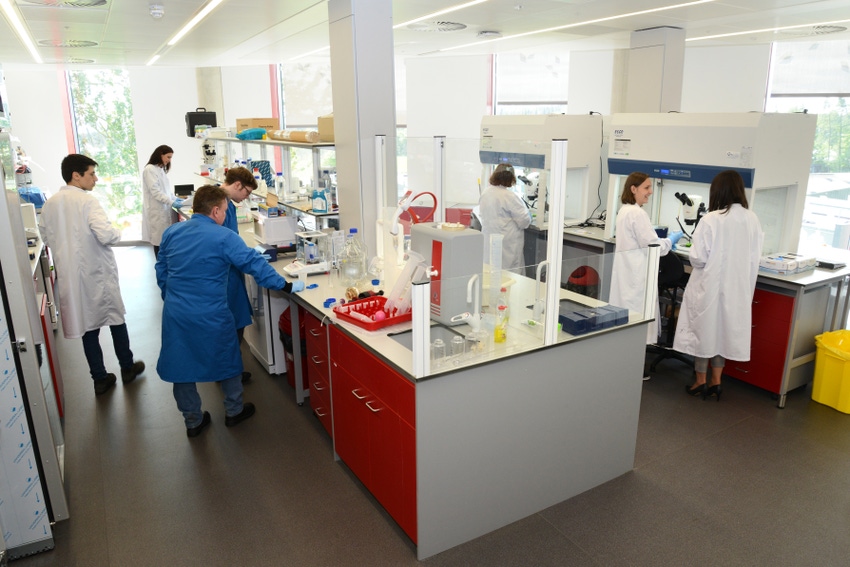U.K.-developed vaccine to undergo large-scale field testing in Nebraska.
September 23, 2019

Roslin Technologies has signed an agreement with animal science research establishments Moredun Research Institute, Scotland’s Rural College and The Roslin Institute at the University of Edinburgh in Scotland to fund the commercial development of an Escherichia coli O157:H7 vaccine for cattle to prevent life-threatening illnesses in people.
The project team has been led by Dr. Simon Wheeler, chief operating officer of Roslin Technologies, with significant input from principal investigators professor David Gally from Roslin Institute and Dr. Tom McNeilly from Moredun Research Institute.
Wheeler said, “Drs. David Gally and Tom McNeilly performed extensive initial research on the vaccine. They’ve been doing the fundamental research necessary to really understand whether the vaccine works and the essential science behind it.
“Now that we’re progressing into the vaccine’s commercial development phase, they are an integral part of the project team and will be deeply involved at every stage as we move forward,†Wheeler added.
E. coli O157:H7 is a pathogenic bacterium of cattle that can cause life-threatening foodborne illness in people through the consumption of contaminated products such as dairy products and meat. Despite efforts to reduce contamination of food, E. coli O157:H7 causes 1-10 cases per 100,000 people, with certain countries having clusters of more virulent strains (the U.K., the U.S., Argentina and Sweden), the announcement said.
The experimental vaccine has been developed to limit E. coli O157:H7 shedding from, and transmission between, cattle, Roslin Technologies said. Although the bacteria don’t harm the cattle, farmers will be encouraged to vaccinate animals against infection, and this new vaccine should enable this to be done cost effectively. Early results have indicated that the vaccine may be more effective than other previous attempts and could have a greater impact in reducing human exposure and infection, the announcement said.
Under the new agreement, Roslin Technologies will perform a two-step validation trial in Nebraska from May to September 2020. The field trials will examine super-shedding in cattle (the passing of large volumes of bacteria in feces) to discover whether the vaccine prevents shedding of the bacteria and is viable for commercial use.
“In order to be granted a license, you have to show positive results from large-scale trials and, particularly for this vaccine, prove it works in the U.S. feedlot system. E. coli O157:H7 is prevalent in the U.S. as well as parts of South America and Europe, including the U.K.," McNeilly said.
“The biggest market for this vaccine is in the U.S. and South America. To be commercially viable, one has to show the vaccine works in their systems. We have a wonderful collaboration with the [U.S. Department of Agriculture], and they’ve agreed to run a field trial in Nebraska with the help of Roslin Technologies,†he added.
Throughout the trials, Gally and McNeilly will advise on the design and execution of field trials, monitoring the cattle, how to administer the vaccine and gathering data.
“I’m delighted that Roslin Technologies has invested in the vaccine as it allows the chance for what’s been over a decade of work, investment and research to go to the next stage," Gally said.
“It means we can build collaboration with U.S. partners to understand how the vaccine works and hopefully provide further commercial development and investment opportunities for Roslin Technologies and other commercial companies in this space," he said.
The background research was funded, in part, by U.K. agencies -- the Department for Environment, Food & Rural Affairs, the Biotechnology & Biological Sciences Research Council and the Food Standards Agency/Food Standards Scotland -- and other commercial partners.
Roslin Technologies chief technology officer Jacqui Matthews recently took over leadership of the vaccine project and will be directing the efforts further towards commercialization of the vaccine by proving efficacy in field trials.
Roslin Technologies is a technology commercialization company based at the University of Edinburgh's Easter Bush Campus. The company was created to develop commercial opportunities from the research, know-how, capabilities and intellectual property of The Roslin Institute and The Royal (Dick) School of Veterinary Studies.
You May Also Like

.png?width=300&auto=webp&quality=80&disable=upscale)

